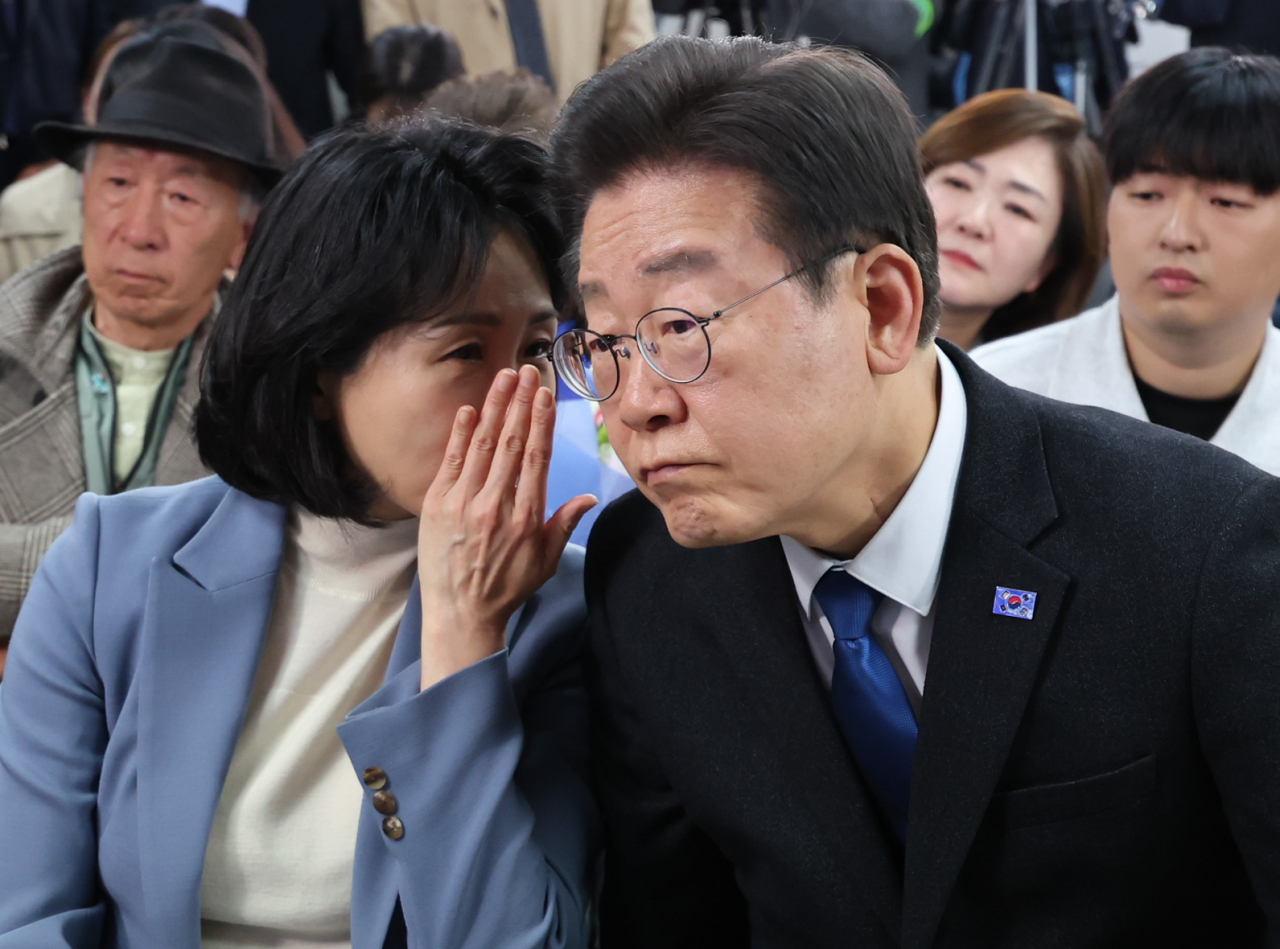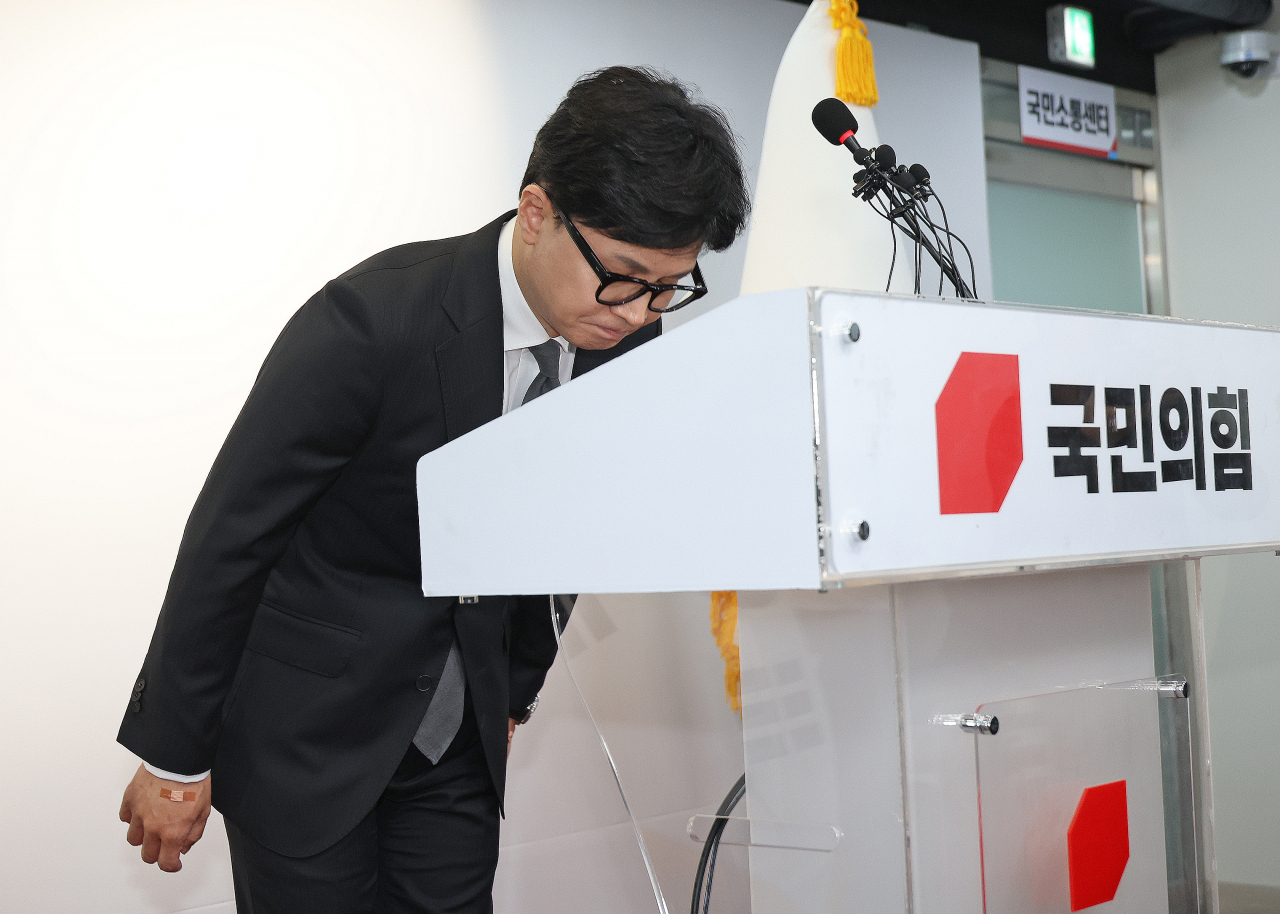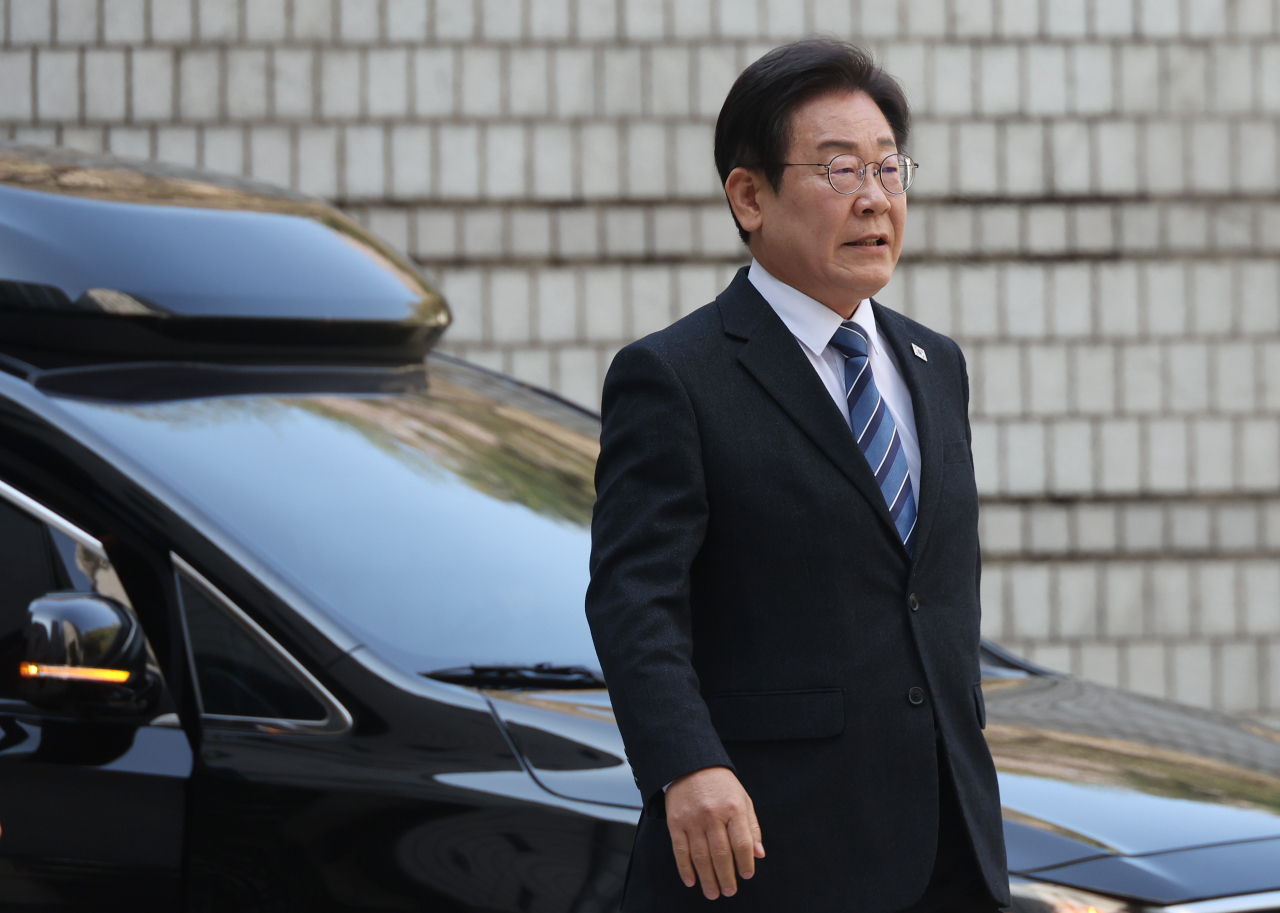 |
Democratic Party of Korea Chair Lee Jae-myung (right) speaks with his wife, Kim Hye-kyung while watching the TV broadcast for the results of Wednesday's general election at his office in Incheon on Thursday morning. (Yonhap) |
Wednesday’s general election concluded in a resounding victory for the main opposition Democratic Party of Korea, which took 175 seats of the National Assembly's 300 seats while the ruling People Power Party scraped up 108.
While Democratic Party leader Lee Jae-myung celebrates what he called "a great victory of the people," the prospect of him becoming a front-runner for the next presidency is murkier than what the landslide victory may suggest.
With Lee winning his own constituency in the Gyeyang-B district of Incheon, speculations are already rising over Lee's prospects for the next presidential election in 2027. The 59-year-old still has obstacles such as legal issues and unfavorable public sentiment if he wishes to succeed in what would be his second run at the presidency.
In addition, he faces a number of potential rivals within and outside the opposition bloc.
One poll conducted March 5-7 of 1,000 adults by Gallup Korea showed that Han Dong-hoon, former interim leader of People Power Party, was ahead of Lee as respondents' favored future leader. At that time, Han, who has since resigned from the post after his party's defeat on Thursday, was written in by 24 percent of the respondents. Meanwhile, Lee was written in by 23 percent.
In addition to Han, former Justice Minister Cho Kuk of the Rebuilding Korea Party is considered a possible competitor for the presidency, along with Lee Jun-seok of the New Reform Party.
While Cho's name was written in by only 3 percent of the above survey's respondents at that time, his party has won 12 proportional representative seats despite having been founded on March 3, only about a month before Wednesday's election.
Lee Jun-seok of the minor New Reform Party, whose name was written in by 2 percent of respondents, managed to clinch his first National Assembly term and is considered to have a solid supporter base among younger conservatives.
Despite the Democratic Party's crushing defeat of the People Power Party, there are indications suggesting that it wasn't exactly Lee's individual appeal or that of his party that were behind the win.
Out of the 300 seats in South Korea's parliament, 254 are allocated to candidates who win direct elections in their constituencies. The remaining seats are distributed to parties proportionally according to the number of votes each party gets. Each voter casts two ballots, one for a candidate in their constituency, and one for a party for the proportional representation seats.
In the contest for the 48 proportional representation seats, the Democratic Party on its own fared relatively poorly in a more direct popularity contest of the two main parties. The main opposition's satellite party won 14 proportional representation seats, while the ruling party's took 18. The Democratic Party's share of 26.69 percent was substantially lower than the ruling party's 36.67 percent, and was actually closer to the minor opposition Rebuilding Korea Party, which won 24.25 percent of the votes and 12 seats by proportional representation.
 |
Han Dong-hoon, former interim leader of the ruling People Power Party, bows while addressing party members at the party headquarters in Yeouido, Seoul on Thursday. (Yonhap) |
The breakdown in proportional representative seats could indicate that there may be a large number of voters who do not support the main opposition outright, but have grown weary or dissatisfied with the Yoon Suk Yeol administration and are looking for change.
The South Korean president's popularity has been waning recently, due to his stance on issues such as his government's conflict with doctors, and price inflation for farm products. One poll last week by Real Meter showed a 36.8 percent approval rating for Yoon, down from 41.9 percent recorded in the fourth week of February.
"I don't support the Democratic Party and I don't really like Lee. But I forced myself to vote for the Democratic Party because I hate Yoon and I thought Korean politics should change," said 25-year-old Yun Mi-yeon living in Gyeonggi Province, who said she voted for the first time because she "wanted someone to control the Yoon administration."
"I actually went to the voting booth to vote for Cho Kuk's party, and I voted for Democratic Party in the constituency vote."
Many voters ended up voting for the Democratic Party despite not supporting it, because the main opposition has a bigger support base and has a better chance of defeating the ruling party. A poll last week by Media Research showed that the People Power Party has an approval rating of 37.8 percent to the Democratic Party's 32.4 percent, indicating that the main opposition party's win may not exactly be because it was more popular.
"I don't support the Democratic Party, but I thought by giving it my support, the Democratic Party and the other opposition parties would run the parliament well," said a woman in her 40s based in Paju, Gyeonggi Province.
A 40-something Seoul-based man surnamed Jeon said he "voted for a Democratic Party candidate but wanted Lee to lose" in his bid for a parliamentary seat in Incheon.
"Frankly I don't think the Democratic Party or the People Power Party differ all that much in what they actually do. But I thought it (the government policies) would be too one-sided if the ruling party had the majority. But now that the Democratic Party has the overwhelming majority, I'm afraid Lee might do whatever he pleases."
Cloud of legal troubles remains
A day before the election, Lee was summoned by the prosecution to court to testify for his suspected involvement in the high-profile corruption case related to a land development project in Seongnam from during his tenure as the mayor of the Gyeonggi Province city. He has been summoned three times during the election campaign, which he claimed was due to "the dictatorial administration and politically-charged prosecution's attempt to tie his hands."
 |
Lee Jae-myung arrives at the Seoul Central District Court in Seocho-gu, southern Seoul on Tuesday, summoned to a court hearing the day before Election Day on his alleged involvement in a high-profile corruption case while mayor of Seongnam city. (Yonhap) |
It is still to be seen what will happen of the legal proceedings for his alleged involvement in the so-called Daejang-dong case -- the name of the neighborhood in which the project took place -- as well as with an investigation for his alleged involvement in the illegal transfer of funds case to North Korea. Lee has denied all charges.
Anyone found guilty in a criminal case, and sentenced to a punishment that is equal to or more severe than imprisonment without physical labor, loses his or her parliamentary seat, according to South Korea's Public Official Election Act.
Political commentators across the country believe that he will be a major candidate for the next presidential election if Lee is innocent. Upon conviction, however, he would lose his seat in the parliament as well as the chance for a payback for his bitter defeat in the 2022 election to Yoon.




![[Exclusive] Hyundai Mobis eyes closer ties with BYD](http://res.heraldm.com/phpwas/restmb_idxmake.php?idx=644&simg=/content/image/2024/11/25/20241125050044_0.jpg)
![[Herald Review] 'Gangnam B-Side' combines social realism with masterful suspense, performance](http://res.heraldm.com/phpwas/restmb_idxmake.php?idx=644&simg=/content/image/2024/11/25/20241125050072_0.jpg)

